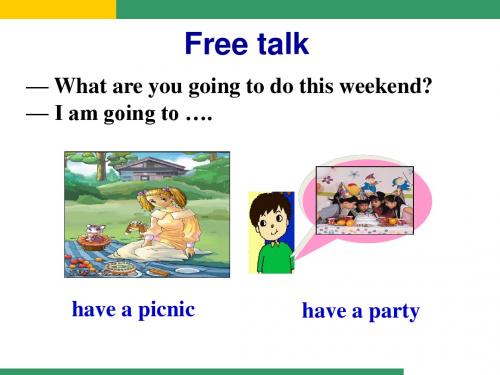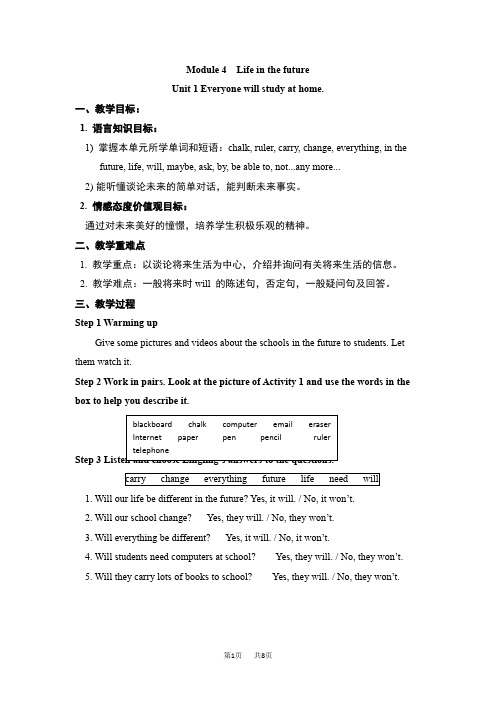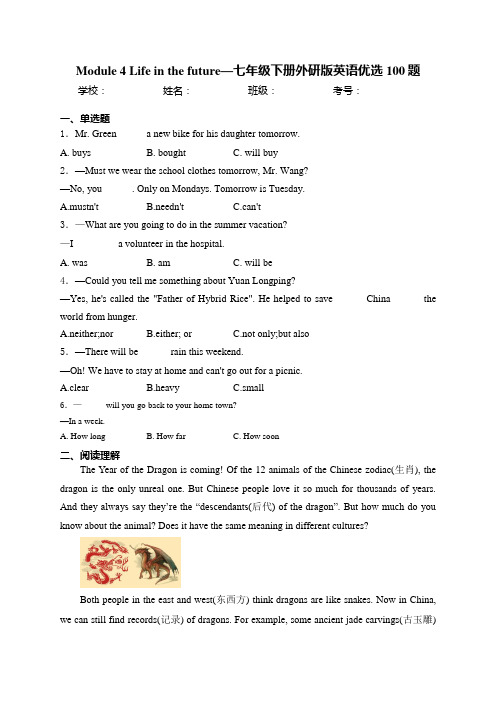七年级英语下册Module+4+Life+in+the+future+Unit+1+Everyone+will+study+at+home教学设计(新外研版)
外研版七年级下Moduel 4 Life in the future课件

take a trip
(去旅行)
What will you do ? this weekend? take a trip. I will _______
go to the cinema
What will you do this evening?
I will go to the cinema.
What will you do?
Exercises
请根据句意选择正确的选项填空。
1. We’ll C ___ for you outside the school gate. A. waits B. waiting C. wait 2. Each of the students will ___ A a computer on their desk. A. have B. has C. having
Example
Everyone uses_______ to learn science.
Example
A few use_________ to lea______ to learn science.
A: Will it be small or big? B: It will be small.
Paragraph A Transport
Paragraph E Technology
Paragraph B Climate
Paragraph C Home
Paragraph D Jobs
一般将来时:will 如果表示的不是打算,意图或计划,而 是未来的事实或对将来的预测等,就要 用“will+动词原形”来表达。
this evening clean my room
What …? will you do this evening?
七年级英语下册 Module 4 Life in the future Unit 1 Everyon

able any more free level maybe need question telephone
Betty: We’ll always (1)__n_e_e_d__ teachers because computers will never be (2)__a_b_l_e__to check the students’(3)__l_ev_e_l___ and answer
life need will
n. 粉笔 n. 直尺 v. 拿;带 v.&n. 改变;变化 pron. 每样事物;每件事; 所有事物 n. 将来;未来 将来 n. 生活;生命 v.&v.aux. 需要 v.aux. 将;将要,将会
完整版ppt
3
maybe adv. 也许 ask v. 询问,问
question n. 问题 by prep. 用;靠; 乘(交通工具)
Will she do the housework?
No, she won’t. 完整版ppt
Won’t= will not
14
1 Look at the picture and describe it. Use the words in the box to help you.
blackboard chalk
football. =We will play football.
完整版ppt
8
What will you do?
I __w_i_ll_c_h_e_c_k__m_y__e_m_a_i_l. check my email
完整版ppt
9
A:What will you do ? B: I’ll …
do the housework
初中英语《Module4Lifeinthefuture》单元教学设计以及思维导图

主题单元学习目标(说明:依据新课程标准要求描述学生在本主题单元 学习中所要达到的主要目标)
知识与技能:1.语法:一般将来时:will + 原形动词。 2.词汇:cable TV, calculator, cell phone, computer, education,
comfortable 等。 3.功能:预测与想象的表达。
Step 1. 创设情境导入 看图片,在小组内描述图片。
Step 2. 展示学习目标 Step 3. 出示提纲学生自学(讲评课出示学案、训练课出示练习题)
自主完成教材上的习题,巩固所学的知识。 Step 4. 师生互动合作探究(讲评课、训练课:自我纠错、合作合作探究)
1.We won’t travel by bus or bike any more.我们将不再乘公交车或自 行车旅行。
专题划分
(说明:除了说明主题单元将划分成几个专题以及每个专
题所用的课时外,还应说明哪一个专题或专题中的哪一个
活动将以研究性学习活动的形式来开展学习活动。)
专题一:Everyone will study at home. ( 一 课时)
专题二:Everyone will have a small car. ( 一 课时)
专题二
Everyone will have a small car.
所需课时 课内共用一课时,每周五课时;课外共用二课时
专题学习目标 (说明:描述学生在本专题学习中所要达到的学习目标, 注意与主题单元的学习目标呼应)
பைடு நூலகம்
To get necessary information from the reading material.
初一七年级英语下册外研版Module 4 Life in the future 教案

Module 4 Life in the futureUnit 1 Everyone will study at home.一、教学目标:1. 语言知识目标:1) 掌握本单元所学单词和短语:chalk, ruler, carry, change, everything, in thefuture, life, will, maybe, ask, by, be able to, not...any more...2)能听懂谈论未来的简单对话,能判断未来事实。
2. 情感态度价值观目标:通过对未来美好的憧憬,培养学生积极乐观的精神。
二、教学重难点1. 教学重点:以谈论将来生活为中心,介绍并询问有关将来生活的信息。
2. 教学难点:一般将来时will 的陈述句,否定句,一般疑问句及回答。
三、教学过程Step 1 Warming upGive some pictures and videos about the schools in the future to students. Let them watch it.Step 2 Work in pairs. Look at the picture of Activity 1 and use the words in the box to help you describe it.1. Will our life be different in the future? Yes, it will. / No, it won’t.2. Will our school change? Yes, they will. / No, they won’t.3. Will everything be different? Yes, it will. / No, it won’t.4. Will students need computers at school? Yes, they will. / No, they won’t.5. Will they carry lots of books to school? Yes, they will. / No, they won’t.Step 4 Listen and read. Then let the students do Activity 3.Step5 Complete the passage of the Activity 4Betty: We’ll always (1) _____ teachers because computers will never be (2) _____ to check the students’ (3) ______ and answer their (4) _____ by (5) _____orInternet. Will students need to go to school (6) _____? Yes, (7) _____they will, because school is good fun, but everyone will have lots of(8) ______ time.Step6 Work in pairs. Ask and answer the questions.1. Will schools be different in the future?2. Will students use books in the future?Step7 Work in pairs. Talk about what your school will be like in ten years.— We will study at home and only go to school for sports and games.— Well, this is good, but I’ll miss my teachers and friends.Step8 Language Points1. In 20 year’s time, maybe there won’t be any schools.句中的“in +一段时间” 表示“一段时间之后”,常用于将来时。
外研版初中英语七年级下册教案:Module4 Life in the future

Module4 Life in the futureUnit 1 Everyone will study at home.本单元以学校为题材,通过对未来的描述,掌握一般将来时的表达方式,同时表达自己对未来的设想,充分发挥想象力,通过对美好未来的憧憬,培养乐观向上的精神。
一.教材分析1.通过对第四模块的学习,学生已经学会使用be going to do 表示计划,安排作某事。
对一般将来时态有了一定的了解。
2.本模块以讲诉学校生活入手,对未来生活展开丰富的想象。
贴近学生生活,大部分学生会对本课产生浓厚的兴趣。
二.教学目标1.知识技能目标(1)词汇能够准确读出并写出cable TV, calculator, cell phone, computer, email, Internet, satellite, climate, education, technology, transport, machine,comfortable, rough, strong, expensive, smooth, dull 等单词;能准确读出technology 等词语。
(2)语法学习一般将来时will do的用法,(3) 技能能通过对本课对话的学习,使学生学会用将来时态表达对未来的设想。
2.情感目标用丰富的想象力预测未来的学校生活,培养乐观向上的精神。
3. 教学重点和难点一般将来时的用法和用一般将来时表达对未来的设想。
三.教学过程Step 1. lead-in:活动1:Ask and answer“What can you see in our classroom?” Ask the students to use the words to d escribe the classroom.[设计意图]:本活动为的是解决对话中出现的词汇障碍,为听对话作好准备,同时,通过对话题的讨论激活学生的背景知识,为听力理解做知识方面的铺垫。
Module 4 Life in the future—七年级下册外研版英语优选100题(含答案)

Module 4 Life in the future—七年级下册外研版英语优选100题学校:___________姓名:___________班级:___________考号:___________一、单选题1.Mr. Green _____ a new bike for his daughter tomorrow.A. buysB. boughtC. will buy2.—Must we wear the school clothes tomorrow, Mr. Wang?—No, you______. Only on Mondays. Tomorrow is Tuesday.A.mustn'tB.needn'tC.can't3.—What are you going to do in the summer vacation?—I ________ a volunteer in the hospital.A. wasB. amC. will be4.—Could you tell me something about Yuan Longping?—Yes, he's called the "Father of Hybrid Rice". He helped to save______ China______ the world from hunger.A.neither;norB.either; orC.not only;but also5.—There will be______ rain this weekend.—Oh! We have to stay at home and can't go out for a picnic.A.clearB.heavyC.small6.—_____ will you go back to your home town?—In a week.A. How longB. How farC. How soon二、阅读理解The Year of the Dragon is coming! Of the 12 animals of the Chinese zodiac(生肖), the dragon is the only unreal one. But Chinese people love it so much for thousands of years. And they always say they’re the “descendants(后代) of the dragon”. But how much do you know about the animal? Does it have the same meaning in different cultures?Both people in the east and west(东西方) think dragons are like snakes. Now in China, we can still find records(记录) of dragons. For example, some ancient jade carvings(古玉雕)look like snakes in a letter “C”. In the west, people see dragons as big snakes in the old book The Penguin Book of Dragons.However, stories about dragons are very different between the East and West. Dragons in China have a horse-like head, a long body but no wings(翅膀). People think they are beautiful and smart. And they can also bring good luck. While dragons in the west have shorter bodies and big wings. They often mean bad luck. Some of them can even blow fire(喷火) from their mouth. For example, the evil witch(邪恶女巫) Maleficent in Sleeping Beauty, can turn herself into a big dragon!East or west, in the world of fantasy, the dragon will always play an important role! 7.Who are the “descendants of the dragon”?A. People in China.B. People in the west.C. People in the east.8.What do people see dragons as in The Penguin Book of Dragons?A. Ancient jade carvings.B. Big snakes.C. A letter C.9.Which of the following is TRUE?A. Dragons in the west can bring good luck.B. Dragons in the east have a short body.C. Dragons in the east mean good luck.10.What’s the best title of the passage?A. Dragons and snakes.B. Dragons in the east and west.C. The history of dragons in China.三、七选五11.根据对话内容, 从所给句子中选出适当的句子补全对话, 其中有两项是多余的。
外研版七年级下册英语Module 4 Life in the future 习题课件 Unit 2
10. Mymotherisateacher, too. (改为同义句) Mymotherisateacher________________.
aswell
11. Whatdoesyoursisterdo? (改为同义句) What________your________________?
7.—Oh, no! We'relate. Thetrainhasleft. 【2019•资阳】
—That’sOK. Thenext________willstartsoon. A. oneB. itC. A
thisD. that
8. Mysisterdoesn'tliketheshow. Idon'tlikeit_______D. A. also B. aswellC. too D. either
9. Ibelievemydreamwill______C_oneday.
A. comehere
B.
comeout
C. cometrue
D.
comeback
10.—____B___willyourschoolbe_______intwentyyears? —Itwillbebigandbeautiful.
答案呈现
一、根据汉语提示完成句子,并背记相应英语词汇 1. Whichanimallivesonlyon________ (陆地)?
land 2. The________(机器) canhelpusdolotsofthings. 3. Nowpmeaocphleinceanwalkin________(太空). 4. Ilovethecity, butIdon'tlikesiptastcreaffic________(堵塞). 5. Therewillbeastrong________(风)intheafternoon.
外研版七年级英语下册 Module 4 Life in the+future专题讲解(有答案)
外研版英语七年级下册Module4 Life in the future专题讲解Name:__________________本单元提纲1. 主题功能:能够谈论未来的生活2. 重点单词:change, ask, traffic, cheap, heavy, hour 等。
3. 重点短语:in the future, not...any more, on the internet, come true, heavy rain 等。
4. 核心句型:Will school be different in the future?Everyone will study at home.等。
语法结构:will结构的一般将来时重难点精讲Will school be different in the future?将来学校会不一样吗?本句是一般将来时的一般疑问句,结构为“will+主语+动词原形+其它?”。
该句式的答语有两种形式:肯定回答Yes,主语+will否定回答No,主语+won’t一般将来时表示的是未来的事情或者是对将来的预测,will没有人称和数的变化。
如果表示将来不会,就要用will not或者缩写成won’t。
题一:翻译:那边将会有一个大型的公园。
将来每张桌子上都会有一台电脑。
我想人人都将用电脑学习。
他们将不用课本。
学校里会有电脑吗?In the future意为“将来,未来”。
in the future 意为“将来”in future 意为“今后,以后”,相当于from now onIn twenty years’ time, maybe there won’t be any schools.在20年后,也许将不会有任何学校。
in twenty years’ time意为“在20年后”,其中years’是名词所有格结构。
在一般将来时中,“in+时间段”表示“在一段时间之后”。
题二:翻译:谁知道将来会发生什么事情?今后多注意你的拼写。
七年级下册英语Module 4 Life in the future Unit1
Module 4 Life in the futureUnit 1 Everyone will study at home.教学目标:知识目标:(1)To understand conversations about future schools(2)To process information of future life in the listening material (3)To talk about the prospect of one’s own school(4)Key structures: will + v.原形;教学重、难点:1.教学重点(1) 过未来学校话题训练学生的听、说、读、写能力,掌握使用简单的一般将来时的句子来表达未来的事情。
(2) 了解一般将来时的基本表达。
2. 教学重、难点:一般将来时的表达。
知识点讲解Will there be schools in the future?将来会有学校吗?1) 一般将来时用在there be 句型中就是“There will be …”。
例如:There will be an English party.将要有一个英语晚会。
(2) in the future 将来。
例如:There will be a computer on every desk in the future.将来每张桌子上都会有一台电脑。
2. Will they send their homework to the teacher by email?学生将通过电子邮件将作业发给老师吗?(1) send sth. to sb. 送某人某物。
例如:She sends me a present.她送了我一件礼物。
(2) by email 通过电子邮件, by 表示方法、手段或方式,是“用……,通过……”的意思。
类似短语有:by air / plane / bus / car / ship / sea ;by phone ; by radio 等。
七年级英语下册:Module_4_Life_in_the_future全模块课件_初中英语(外研版) (2) - 副本
Try to describe it with your own words. Students will:
study at home use computers use the Internet send homework to the teachers by email talk to the teachers on the computers have a computer on the desk read books or use the Internet use books write on a blackboard with chalk use paper, pencils and pens
精讲点拨
1.
send sb. sth 把某物发送给某人 send sth. to sb. Example: 请发给我一封邮件。 send me Please ______ _____an email. send to me Please ______an email ______ _____. 2. by email 用/通过电子邮件. by 在此处是介词,表示方法,手段, 或方式,是 “用…, 靠…, 通过…”之意。如by bus/by train. Eg: 他们将通过电子邮件发送作业。 will send by email They ____ _____ their homework____ ______. 3. talk to sb. 和某人交谈。 Eg: 我要和你爸爸谈谈。 will talk to Tomorrow I ____ _____ ____your father. 4. with chalk , 用粉笔, 跟使用的工具. He cut an apple with a knife. feet 我们用脚走路。 We walk with our______. _____
- 1、下载文档前请自行甄别文档内容的完整性,平台不提供额外的编辑、内容补充、找答案等附加服务。
- 2、"仅部分预览"的文档,不可在线预览部分如存在完整性等问题,可反馈申请退款(可完整预览的文档不适用该条件!)。
- 3、如文档侵犯您的权益,请联系客服反馈,我们会尽快为您处理(人工客服工作时间:9:00-18:30)。
Step Ⅱ: Presentation ⅣⅤ
(2) What are you going to do at this weekend? (3) What will you do at this weekend? (help students answe r) 3. Have students to work in pairs to practise will+do
Students practise structure this: I will football afternoon
Байду номын сангаас
the like play this „„
Students look at the questions and elicit the answer “The future
本练习可以让 学生更熟悉 will+do 结构 表达的一般将 来时,为后面 的听力做准备
the and the with
Students listen recording answer question: ”How
and answer choices in Activity2. and then repeat chorally. ” Studens lisen the recording and choose the answers. 听力训练,注 意策略的使 用,以达到 锻 炼学生听力能 力的效果。
Students listen recording check answers their partners.
like going piano this The students answer: Yes, I am / No, I’m not. 用 be going to +do 的 操 练 引 出 will+do, 旨在 以旧带新,使 同学们在很自 然的复习语境 中导入到新课 的学习。呈现 出 will+do 这个时态,让 学生有一个初 步的概念。
Students read the que stions
- 3 -
chorally.
4. play the recording through while students listen for the answers to the questions. 5. play the recording again for students to check the answers . 6. tell the class they are going to listen to a conversation and answer this question:”H ow many people think school will be different in the future?” 7. play the recording through as the students listen, and then ask them to check their answers in pairs. 8. read the statements
3.Have students to look at the picture and describe it in pairs using the new vocabulary.
Students can describe the picture correctly.
1.Ask
some
- 2 -
questions this: (1)Are you to play the at weekends?
Module 4 Life in the future Unit 1 Everyone will study at home
- 1 -
教学目标 教学重点 教学难点
1. To understand conversations about future life 2. To talk about school life in the future 以谈论将来生活为中心,介绍并 询问有关将来生活的信 息 描述将来生活涉及的一些词汇及他们在句中的正确运 用。 前一模块已经学过用 be going to 结构描述将要做某事, 以及询问别人将要做某事,本单元在此基础上引入到用 will 谈论将来的生活。 Bot tom-up approach
学情分析 学法指导 教学过程
教学内容
教师活动
学生活动
效果预测(可 能出现的问 题)
补救措 施
修改意见
1.Ask the students what words they can use to describe our classroom.
Step Ⅰ: Warming-up
2.Read through the words in the box and make sure they can know their meaning all in Activity 1.
Students can use words: blackboard computer eraser paper pen pencil ruler desk chair M ost of the words they can understand.
学生可能对正 确发音新单词 又困,需要逐 个纠正直至改 正
I’m going to do my homework „„. I will do my homework at this weekend.
Step Ⅲ Listening
1.Tell students that Linglng is talking to her teacher, then ask students to look at the questions And ask students if they are talking about now or the future. 2. Have students to read the questions and answer choices in Activity2. and then ask them to repeat
